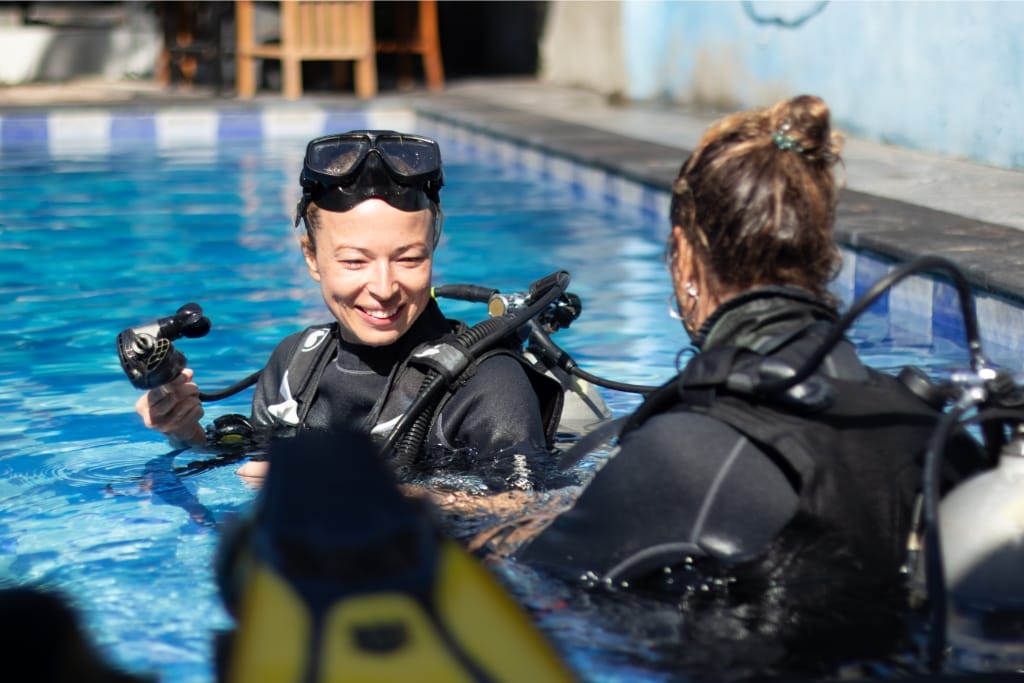The underwater world holds incredible beauty and endless opportunities for amazement.
From vivid coral gardens to the gentle rhythm of aquatic life, each moment offers something extraordinary.
Ensuring your first underwater adventure is unforgettable requires thoughtful planning and some simple steps.
Follow along as we share the best tips to help you fully enjoy your time beneath the waves and leave you longing for your next underwater getaway!
1)) Get Certified
Getting certified is an essential first step before embarking on your underwater adventure.
Scuba certification courses provide the knowledge and hands-on training necessary to ensure your safety and comfort while exploring marine environments.
These courses teach you how to use equipment properly, communicate underwater, and handle potential challenges.
Certification also allows you to build confidence and gain a greater appreciation for the underwater world.
With your certification in hand, you'll be ready to fully experience the wonders waiting beneath the surface.
2)) Check Your Gear
Properly checking your gear is crucial to ensure a safe and enjoyable underwater experience.
Start by inspecting your scuba equipment for any signs of wear or damage, paying close attention to hoses, buckles, and seals.
Make sure your mask, fins, and wetsuit fit comfortably, as well-fitting gear greatly enhances your experience.
It’s also important to test your regulator and buoyancy control device to confirm they are functioning correctly.
Taking the time to double-check your setup gives you peace of mind, allowing you to focus entirely on the wonders of the underwater world.
3)) Practice Breathing
Mastering your breathing technique is a key component of an enjoyable and efficient scuba experience.
Controlled, steady breaths not only help conserve your air supply but also keep you calm and relaxed underwater.
Before your dive, practice deep and slow breathing exercises to improve your awareness and control.
Pay attention to how your body feels as you inhale and exhale, aiming for smooth, even rhythms.
Good breathing habits also help you maintain better buoyancy and reduce fatigue during your time beneath the surface.
With practice, you'll feel more at ease and better prepared to take in the marvels of the underwater world.
4)) Master Buoyancy
Achieving proper buoyancy control is fundamental to a successful and enjoyable scuba experience.
Mastering this skill allows you to glide effortlessly through the water without disturbing marine life or damaging delicate ecosystems like coral reefs.
Start by familiarizing yourself with your buoyancy control device (BCD) and using it to adjust your position subtly as you descend or ascend.
It’s also important to fine-tune your weighting system; carrying too much weight can make it difficult to stay buoyant, while too little can lead to challenges in maintaining stability.
Perfecting buoyancy not only enhances your mobility but also conserves energy, allowing for longer, more comfortable dives.
With consistent practice, you’ll move seamlessly through the underwater world with grace and ease.
5)) Study The Location
Researching your dive location is an important step to ensure a safe and enriching underwater experience.
Familiarize yourself with the area’s unique features, such as marine life, currents, and water conditions, to better understand what to expect.
Studying the local regulations and etiquette is equally essential to protect the delicate environment and respect the ecosystem.
Learning about the best entry and exit points, as well as any notable landmarks underwater, helps you plan your navigation effectively.
By equipping yourself with this knowledge, you’ll feel more confident and prepared to fully enjoy the beauty and diversity of your chosen destination.
6)) Follow Your Guide
Following your guide is essential for ensuring a safe and enjoyable underwater adventure.
Professional guides are experienced divers who possess in-depth knowledge of the area, including its currents, marine life, and potential hazards.
By paying attention to their instructions and signals, you can avoid risks and make the most of your time exploring.
Guides often point out fascinating features or elusive creatures you might otherwise miss, enriching your experience.
Staying close to your guide not only enhances your safety but also deepens your appreciation for the underwater environment.
Trusting in their expertise ensures you’ll have a memorable and worry-free adventure.
7)) Respect Marine Life
Respecting marine life is vital to preserving the delicate balance of underwater ecosystems.
Always observe marine creatures from a safe distance, avoiding any contact that could cause harm or stress.
Touching coral, chasing fish, or interfering with an animal’s natural behavior can have lasting negative impacts, not only on the individual creatures but also on the entire ecosystem.
Practice environmentally conscious habits by securing your equipment to prevent accidental damage and by refraining from leaving any waste behind.
By treating marine life with care and reverence, you contribute to the health of underwater habitats and ensure that future generations can experience their beauty and diversity.
8)) Monitor Air Supply
Maintaining awareness of your air supply is one of the most critical aspects of scuba diving safety.
Regularly checking your pressure gauge ensures you have sufficient air for both your planned dive time and a safe ascent, including any necessary safety stops.
Develop the habit of glancing at your gauge throughout the dive, particularly as you approach the halfway point of your tank’s capacity.
Communicate with your buddy about your air levels to stay synchronized and avoid unexpected emergencies.
By staying vigilant and proactive, you’ll be able to enjoy your underwater adventure with peace of mind and return to the surface safely.
9)) Plan Your Dives
Thoroughly planning your dives is essential for maximizing safety and enjoyment during your underwater explorations.
Before entering the water, establish a clear dive plan with your buddy, including details such as the maximum depth, bottom time, and turnaround points.
Familiarize yourself with the underwater topography and potential hazards to avoid unnecessary risks.
Always account for contingency plans in case of unexpected changes in conditions or equipment issues.
Careful preparation helps you stay organized and reduces stress during your dives, empowering you to fully immerse yourself in the underwater experience.
Effective planning ensures you and your buddy can explore confidently and return safely to the surface.
10)) Stay Calm Underwater
Staying calm underwater is a crucial skill for every diver, as it enables clear thinking and effective decision-making in any situation.
Anxiety or panic can lead to poor judgment and increased air consumption, potentially endangering your safety.
Focus on maintaining controlled, steady breathing to keep yourself relaxed and conserve your air supply.
If you encounter an unexpected issue, pause and assess the situation rather than reacting impulsively.
Rely on the training and techniques you’ve practiced, and don’t hesitate to communicate with your buddy or guide for assistance.
Remaining composed allows you to handle challenges with confidence and ensures a more enjoyable and safe diving experience.
Conclusion
Scuba diving offers an unparalleled opportunity to connect with the underwater world, creating memories of breathtaking beauty and adventure.
By adhering to essential practices—ranging from respecting marine life to planning your dives and staying calm underwater—you can ensure both your safety and the preservation of these fragile ecosystems.
Every diver plays a role in protecting the ocean, and by approaching each dive with responsibility and mindfulness, you can contribute to its continued splendor for years to come.
Download Our Free E-book!







